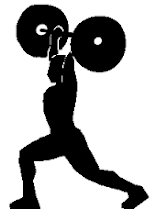Low fat no fat. Low Carbs no Carbs. High Protein. All the nonsense out there just can make your head spin. So what's the answer? Is there one and who do you believe?
If you want to be a fat loser and muscle builder according to Will Brink the author of Fat Loss Revealed and Bodybuilding Revealed it comes down to 3 essentials:
- What to Eat
- What to do
- What to take
What to Eat
Regularly eating the right foods often is a large part of gaining lean body mass or losing fat weight. The fact is that in the gym we are there to stimulate body composition change. Outside the gym is when that change actually takes effect: through proper nutrition and sufficient rest.
The hardest part for most people is eating properly. Keep this fact in mind.
To be a successful and permanent Fat Loser and Muscle Builder What you eat is 70% of the battle. That's right it breaks down to 70% Nutrition 30% Training
Without proper nutrition you can do all the workouts you want but you will never get the look and health benefits your after.
The 3 basic food essentials are:
Carbohydrates- Carbohydrates provide the body with the fuel it needs for physical activity and for proper organ function. Low carb diets will give you very short term weight loss but not permanent fat loss while robbing your body of its energy source.
Carbs come in two forms: simple and complex-Complex carbs are used for timed-released and sustained energy. Starch, cereals or vegetables are good sources of complex carbs and are your ideal source. Complex carbs make you feel satisfied or full after a meal.
Refined sugar (a simple carbohydrate) should be avoided it gives you a quick burst of energy that fades fast leaving your body wanting more.
1 gram of Carbs = 4 calories
Protein- is the main component of muscles, organs, and glands. Every living cell and all body fluids, except bile and urine, contain protein. The cells of muscles, tendons, and ligaments are maintained with protein.
Protein is known as the building block for adding muscle.
1 gram 0f protein = 4 calories
All meat and other animal products are sources of complete proteins. These include beef, lamb, pork, poultry, fish, shellfish, eggs, milk, and milk products. Keep in mind that there can be a higher fat content in some of these. Stick to the leaner cuts of meat and non-fat milk products.
Fat- Yes there are essential fats that your body needs. The major kinds of fats in the foods we eat are saturated, polyunsaturated, monounsaturated and trans fatty acids. Saturated fats and trans fats raise blood cholesterol. Dietary cholesterol also raises blood cholesterol. A high level of cholesterol in the blood is a major risk factor for coronary heart disease, which leads to heart attack, and also increases the risk of stroke.
1 gram of fat = 9 calories
When looking at a food label, pay very close attention to the percentage of saturated fat and avoid or limit any foods that are high. Saturated fat should be limited to 10% of calories. Saturated fats are found in animal products such as butter, cheese, whole milk, ice cream, cream, and fatty meats. They are also found in some vegetable oils -- coconut, palm, and palm kernel oils. Most other vegetable oils contain unsaturated fat and are healthy.
Excess calories contribute to fat gain and so does excess fat consumption. If you're a calorie counter then count fat calories.
Permanent Fat Loss and Muscle Building is not easy. It takes discipline and work. But it can be done. Nutrition is your first step (and your most important)

No comments:
Post a Comment